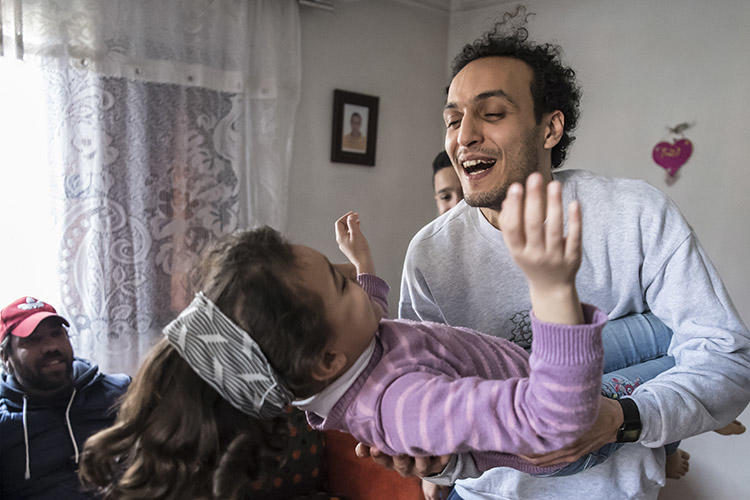Relief over the release of Egyptian journalists Mahmoud Abou Zeid, known as Shawkan, and Alaa Abdelfattah from prison last month has been clouded by the conditions of their freedom. “I am happy to see your joy over my release, but I am unfortunately not free,” Abdelfattah wrote to his large following on social media yesterday. The journalist described the terms of his five-year probation period with police monitoring as “humiliating.”
After five years in custody on anti-state charges, Abdelfattah was released on March 29, on condition that he stay overnight at a police station. Authorities imposed the same condition on Shawkan, an award-winning photojournalist and CPJ’s 2016 International Press Freedom Awardee who also served over five and a half years in prison on arbitrary anti-state charges.
Both Abdelfattah and Shawkan have to report to a police station at 6 p.m. daily. It is left to the discretion of the officer on duty as to whether they spend the night in cells or just sign in and leave, though so far both have spent every night of their “freedom” behind bars.
“60 months in jail for a demonstration that lasted for 15 minutes is enough, even for an authoritarian state,” Abdelfattah wrote on Facebook. The journalist was jailed over his reporting on politics and human rights violations for outlets, including the independent al-Shorouk and the progressive Mada Masr.
“The police know where Alaa is,” Abdelfattah’s mother, Laila Suief, told me today. Suief, who is a renowned human rights activist, decried the release conditions as “unnecessary and unjustifiable by law.” Police lack neither the resources nor the authority to monitor Abdelfattah at home, Suief said over the phone, after spending the evening protesting how police denied Abdelfattah the right to bring books and an iPod with him into custody overnight.
Every day since he was freed on March 4, Shawkan has been kept in custody overnight, and on one occasion he was kept inside for two days and two nights in a row, his lawyer, Taher Abu-Nasr, told me last week. To this day, authorities have cited no specific evidence to justify jailing him or continuing to restrict his freedom, nor did they give him an appeal date for contesting the conditions of his release.
Shawkan continues to try to piece a life together under these restrictive conditions. In a post pinned to his Twitter account, from March 18, he wrote, “Could somebody stops the TIME or at least slow it down? Coz I don’t wanna return to the police station and be there until the dawn.”
The daily deadline to report to police is apparently never far from his mind: when he visited the pyramids with the Egyptian blogger, Wael Abbas, Shawkan posted on social media that he chose the site because it was close to the police station to which he needs to report. Abbas, who spent more than six months in prison as part of the mass trial of people accused of spreading false news, was released in December under a similar deal. He must report to police every Sunday and Wednesday between 7 p.m. and 9 p.m., he told me.
“Unlike police monitoring–where you know you it is for 12 hours a day, every day–precautionary measures are defined entirely by the judge, who could order the person [being] released to spend a few hours or more [in custody] for a few days in the week,” Tarek Hussein, an Egyptian human rights lawyer, told me in Washington D.C. last week.
“It is an ancient article in the penal code that gives the judge the right to add additional punishment to protect society against criminals during the night,” Hussein, who advocates for freedom of the press from Tunisia, said. “It only became applied to political prisoners after the 2013 and the 2014 protests.”
It was around this time that Egypt became one of the world’s worst jailers of journalists. CPJ found that Egypt led the world in using false news charges to jail journalists last year.
And as of last month, the government regulatory body, the Supreme Council of Media Regulation, issued guidelines that allow authorities to penalize journalists or others with over 5,000 followers on social media who are accused of publishing false news.
That is why, in describing the cruelty of not being able to finish his son’s swimming lessons or put him to bed every night, Abdelfattah stopped short on social media of making a direct criticism. “The subject of justice makes them annoyed,” he tweeted in a subtle hint about his additional time spent in jail for “insulting the judiciary.”
